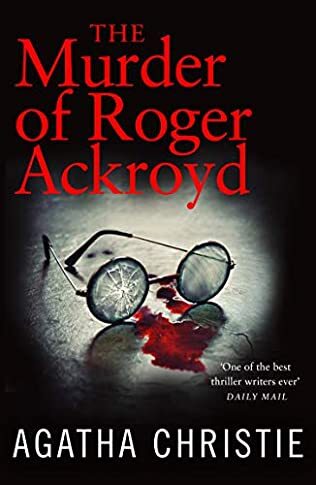The Murder Of Roger Ackroyd

A review of The Murder of Roger Ackroyd by Agatha Christie – 230320
I have not read, let alone reviewed, much of Agatha Christie’s books. If I was pressed to explain why it is because so many have appeared, in one form or another, on the silver or small screen that many of their plot lines are familiar, even if I could not immediately place one with any particular book. The other reason is that there are so many reviews of each of the books that it is hard to come up with anything original to say about them. Still, not with any sense of imminent mortality, I thought it was high time I sat down with one of her best, most famous and, certainly, notorious novels, The Murder of Roger Ackroyd, originally published in 1926 and the fourth in her Hercule Poirot series.
I am not a great fan of detective fiction novels that are narrated in the first person. The have an air of artificiality about them as the narrator has either to be present at every critical moment or has to be brought up to speed with an account, which might as well have been given in the third person in the first place. A reader from Mars, who had not the faintest idea about the plot of this book, might have been put on their guard when Christie ditched the previous faithful but dense Hawkins, now improbably away in the Argentine, as narrator in favour of James Sheppard, the doctor at King’s Abbott.
The good doctor is there the evening that Ackroyd is murdered, one of the last people to see him alive. Ackroyd consulted him because Mrs Ferrars, who has just committed suicide, had told him that she had poisoned her husband and had sent him a letter explaining that she had been blackmailed and giving him the name of the blackmailer. However, Ackroyd stops short of reading who that is in Sheppard’s presence. Why did he do that? Was there something which, in retrospect, he did not want Sheppard to know?
Sheppard is on the scene when the door to Ackroyd’s study is broken down, having been summoned by an anonymous and mysterious phone call purporting to be from the butler, Parker, announcing that Ackroyd had been murdered. The account of the murder and the investigations of Poirot, who just happens to have retired to the village to grow marrows, that Sheppard produces is accurate as far as it goes, as Poirot concurs when he has read it, but is vague on certain particulars, not least on a crucial ten minutes and why a chair had been moved, a piece of evidence that the Belgian sleuth regards as crucial.
There is only a small and select group of suspects but each, as Poirot reveals, as the revolutions of his little grey cells begin to increase, has been less than honest in their accounts of their movements, status, and their motives. There is also some uncertainty as to the precise timing of the murder which could have a significant bearing on the cogency of some of the alibis. There are red herrings galore, some amusing if stereotypical characters, clandestine marriages, a bit of cocaine addiction, a convenient ship’s steward on their way back to Liverpool, a feather, a wedding ring, and an overwhelming sensation that things look bad for Ackroyd’s wayward nephew, Ralph Paton.
There is a remarkable twist at the end, which a diligent reading of the text might have prepared the reader for even if they were not aware of the controversy surrounding the book. It is rather effortlessly and seamlessly achieved, particularly when compared with the abruptness that Richard Hull was forced to employ in his The Murder of My Aunt, an effective piece of plotting that makes for a powerful ending.
I was particularly taken by the imaginative use of a piece of then modern technology, the Dictaphone. It made for a refreshing change from the usual gramophone or wireless playing in an empty room.
Christie is a master storyteller, writing in a deceptively simple style, an art in itself. Poirot is his usual annoying, omniscient self but, as he likes to remind us, nothing gets past him. It is easy to see why this book was voted the best crime novel ever by the British Crime Writers’ Association in 2013.



